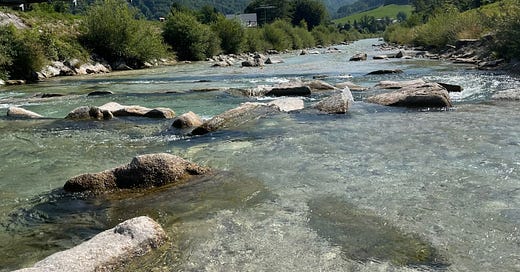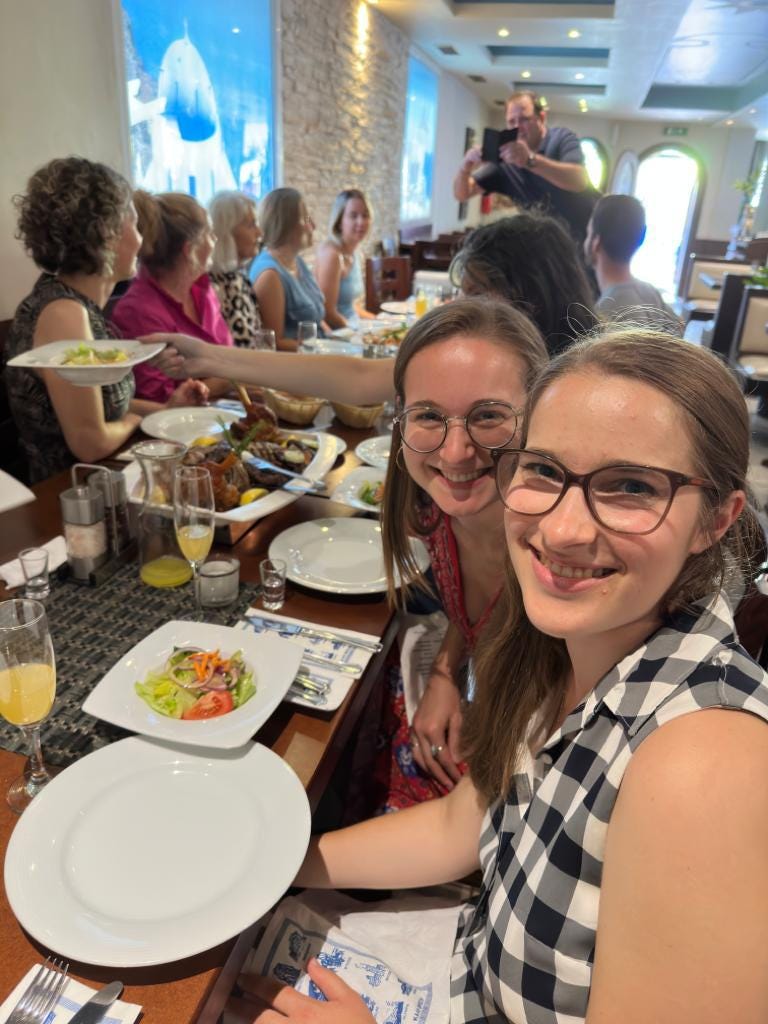In July, I visited my friend Yasmine in Austria where she was living for a year. Running through the small town she lived in was a river - cool, rocky, and perfectly clear, and on hot days the town would come out and spend hours soaking in the river.
Though never deeper than a few feet, the current could get strong at parts, and townies would sometimes let the current take them with it as it snaked between rocks.
On my last day in Bad Ischl, I brought my journal to the river, sitting on a rock in the middle of the stream a few hours before my train would leave.
As I watched the river, I thought about a podcast I had listened to earlier that week where the artist Scott Erickson said that prayer is the turning of our attention to what the Divine is doing in our lives. I have wondered how to explain this mysterious presence, guide, and force in my life, and found the river in front of me so encapsulating.
This is what faith means to me: for every person, out of the heart of God, flows a river of their belovedness. Unstoppable. Unexplainable. That flows and flows indiscriminately and confidently.
Like the river I was sitting in, this river of love is beyond our control. It flows for us whether we like it or not. Whether we asked for it or not. Whether we believe it exists or if we are worthy of it or not. Regardless of the harm done to us or that we have done, it flows.
We can believe this river exists yet never see it. We can see it from afar and say “Yep, there it is.” We can go down and dip our toes in it. Or we can climb in and experience the reality of love in our human existence and let it cover us. We can let go of control and let this powerful force of goodness take us places we could never know from the start.
Sitting in the river, I ran the metaphor as far as I possibly could.
I don’t like roller coasters, big slides, or even drive-through carwashes—all things in which I find myself feeling extremely out of control and at the mercy of the forces around me. So though I sat in the river a few times, I never handed myself over to the currents, however temporarily.
As I settle into adulthood and experience the slight increase in stability that being in the latter half of my twenties can bring, the more I have found myself surprised at the oversized role fear and control play in my life.
This is the great letting go: to believe there are powerful and deeply kind forces that are acting on my life to bring goodness, beauty, love, and healing into the reality of my daily existence.
Is this the work of the believer—to, in all things, seek to join the river of their belovedness? And to see also the river that flows for everyone else?
It’s my daily work—some days harder than others. To receive rather than control. To let go rather than clutch. To say: I will not take it upon myself to explain the unexplainable. I will join the mystery and enjoy it. I will let myself be a part of the gift.
Not just to talk of love’s existence, to see if from afar, or catch it in our hands, but to live continually in that baptism. To be carried forth by the deepest reality of our existence: I am loved. Beyond my doing and control, love, goodness, and kindness for me continue to be brought forth.
The day before, I joined my friend in attending her Orthodox Church made up almost entirely of Serbian immigrants, a few Austrians, and one American (her), an hour away from her town.
It was her last week in Austria and in the 9 hours spent between their service, coffee reception, and her goodbye celebration, I experienced an ancient practice in languages I didn’t know, so much food and drink, the loudest songs I’ve ever heard sung in a restaurant, a lot of conversation comparing theology and culture, and the best hospitality I have received.
On the drive back to her apartment I realized I had just experienced a Christian context untouched by purity culture for the first time in my life. This is one of the oldest expressions of the Christian faith, passed down and preserved from the 4th century, and has existed entirely separately from the evangelical movements in the west.
We all have rules: some different, some the same. Every culture is beautiful and flawed. No theology or ideology is fully perfect. All of it is somehow influenced by cultural and personal history. We can be prone to either favor and elevate our own traditions or idealize the traditions of others because of our awareness of the flaws in our own, which is probably more human than inherently good or bad.
At lunch that day the priest said there is no other authentic life for him than to be Orthodox and to be a priest.
How true and valid that is. How blessed it is that he gets to walk authentically in the world in this way, a life lived in the river of his belovedness.
As the poet, Rumi, said, “There are hundreds of ways to kneel and kiss the ground.”
How beautiful it is to not need to be right, but instead find a treasure and say: I want to stay near this. I want to be a part of this thing that has touched me and called me forth. I will live life out of my belovedness.
Rumi also said “Out beyond ideas of wrongdoing and rightdoing, there is a field. I'll meet you there. When the soul lies down in that grass, the world is too full to talk about. Ideas, language, even the phrase ‘each other’ doesn't make any sense.”
A place where we are all so Divinely loved and seen, where value is not relative to anyone else, where we are free to just be. Where maintaining control is not necessary because there is Goodness looking after us. A place that is breaking into our present lives if we look for it.
I’ll meet you there.





